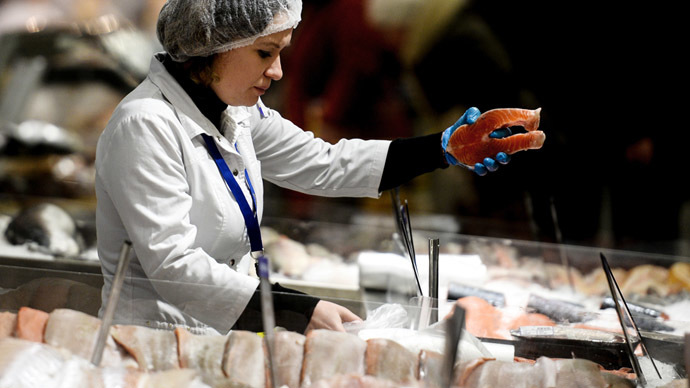Leftists call for lifting Russian embargo on food imports

A group of leftist MPs have submitted a bill contesting the 6-month old embargo on alimentary products produced in the countries that apply economic sanctions against the Russian Federation.
The authors of the motion are four lawmakers representing the center-left political party Fair Russia. The fifth sponsor is MP Dmitry Gudkov, who describes himself as an independent because he was expelled from the Fair Russia party in 2013 for taking part in anti-government street protests. He still occupies his seat on Fair Russia’s ticket though.
The explanatory note posted on the Lower House’s web-site together with the text of the initiative alleges that the ban on supplies of foreign-made foodstuffs contradicts the article 34 of the Russian Constitution that guarantees any citizen the right to use own capabilities and property in entrepreneurial activities.
“The ban on imports of good quality foodstuffs that are safe for the citizens’ health has led to a limitation of the constitutional right of Russian businesses for economic activity, because many companies do not possess an economically feasible alternative for materials that their technological cycles are based on,” the document reads.
The MPs who drafted the bill also noted that the Constitution allows for limiting the basic citizens’ rights when it is necessary for protection of the state and interests of other members of the society, but such limitations should only exist in the form of a federal law. However, the existing embargo was introduced by the presidential decree “On using separate special economic measures for ensuring the security of the Russian Federation” dated August 6, 2014.
The sponsors of the motion suggest to alter the the federal laws “On Special Economic Measures” and “On State Security” so that these acts include the procedure of using special economic measures.
The Lower House committee for Economic Policy will not support the motion, deputy chairman of the body, MP Anatoly Karpov (United Russia) has said. “This is the government’s sphere, not the legislative bodies. I see no legislative basis here and the State Duma has no powers to detail such laws,” Karpov told TASS news agency.
The parliamentary also added that in his own opinion the decision to introduce the embargo on food products from countries that use sanctions against Russia “was right in principle, with certain miscalculations allowed for certain types of products.”
“The Ministry of Agriculture and the government have said that there would be no deficit and in most positions everything is all right,” Karpov noted. He added that if the embargo is prolonged (the initial sanctions were introduced for a year with possible prolongation), Russian specialists would find methodsto minimize the negative consequences for the national economy.
The current restrictions are applied to meat, poultry and fish, cheese, milk fruit and vegetables from the United States, the EU countries, Australia, Canada and Norway. Soon after they were introduced in August last year the nationalist party LDPR suggested to extend the ban to food imports from nations that have an association agreement with the EU, including Ukraine, Moldova and Georgia, but this motion has found no support in the Russian parliament.











